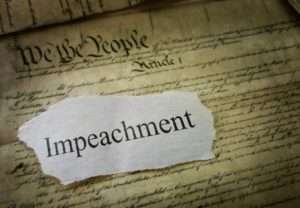The Volokh Conspiracy
Mostly law professors | Sometimes contrarian | Often libertarian | Always independent
Make Impeachment as Bipartisan as Possible
Impeachment can only succeed if it has substantial bipartisan support. Here are some ways to help make that happen.
The House of Representatives will almost certainly vote to impeach Donald Trump today. But for this effort to succeed in the goal of convicting Trump in the Senate and barring him from seeking office in the future, it will require substantial bipartisan support. Even after the Senate shifts to a 50-50 split, with the seating of the senators elected in the Georgia runoff election, conviction will require at least 17 votes from GOP senators.
In order for impeachment to have the desired effect of discrediting Trump and deterring similar misconduct by future presidents, it would also help if it had broad support from independents and Republicans in the general public. Making the process bipartisan can help with that, as well.
Some important progress towards building the necessary bipartisan coalition has already been achieved. Several House Republicans plan to vote for impeachment, most notably Rep. Liz Cheney, the third-ranking member of the House GOP leadership. Numerous conservative and libertarian legal scholars and political commentators are also backing impeachment (I give examples here and here, and there are plenty of others, such as Ramesh Ponnuru, Henry Olsen, and Federalist Society co-founder Steven Calabresi). Perhaps most importantly, Senate Majority Leader Mitch McConnell is reported to be supportive of impeachment, believing that it might serve the longterm interests of his party.
Nonetheless, more can be done to build a broad coalition for convicting Trump and barring him from future office-holding. In a previous post, I mentioned that congressional Republicans who oppose impeachment because of concerns that it might cause conflict or disunity can address that problem through the simple expedient of supporting impeachment themselves. In this one, I outline some steps congressional Democrats can take.
First, House Speaker Nancy Pelosi should recognize that she made a mistake by naming an all-Democratic team of impeachment managers to argue the case before the Senate. She should replace at least one of them (preferably two or three) with House Republicans who voted for impeachment, such as Liz Cheney and Adam Kinzinger. The reason is not that Cheney or Kinzinger would necessarily do a better job of arguing the issues than a Democrat would. Rather, Pelosi should take this step because of its enormous potential symbolic value - conveying the message that impeachment is not just another iteration of partisan politics as usual.
Second, if the Senate trial will include witnesses testifying about the legal issues involved, the impeachment managers should make sure to call one or two of the many conservative and libertarian legal scholars who have advocated impeachment. That could have considerable symbolic value, as well, and would be a contrast with the Democrats' reliance on purely liberal expert witnesses during the last impeachment process.
Legal scholars Noah Feldman, Michael Gerhardt, and Pamela Karlan did a great job the last time around, in my view. But the Democrats would have done well to call at least one non-liberal witness on these issues. That would have given their efforts greater credibility with informed opinion on the right and center of the political spectrum. If expert witnesses are used this time around, the Democrats would do well to remedy that mistake.
To avoid misunderstanding, I should emphasize I am not suggesting that I should be a witness myself. To the extent Democratic leaders care what I think (unlikely, I know), I would recommend Steve Calabresi, Michael Stokes Paulsen, and VC co-bloggers Jonathan Adler and Keith Whittington for their consideration. Any of them would be clearly better choices than me. Calabresi, in particular, would be an outstanding selection, because of his longtime role as a leader of the conservative legal movement.
These are probably not the only ways that the Democrats can do more to involve conservative and libertarian supporters of impeachment in the process. I hope other commentators will come up with additional, and perhaps better, suggestions. The key point is to build as broad a coalition as possible, and to send a message of inclusion.



Show Comments (350)